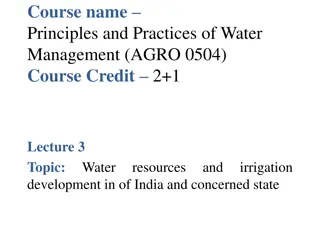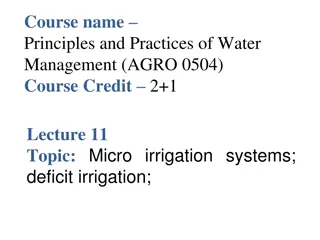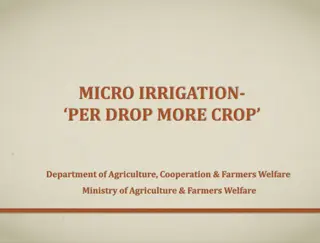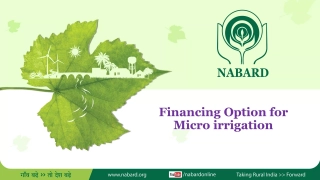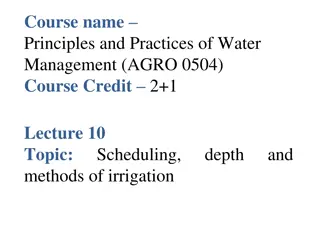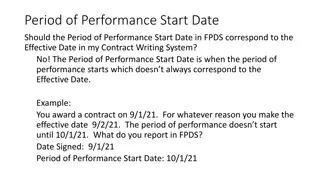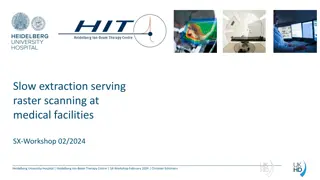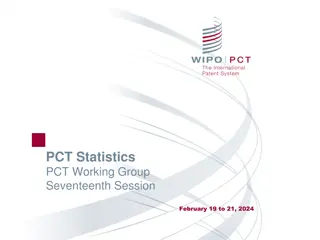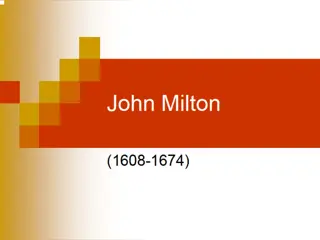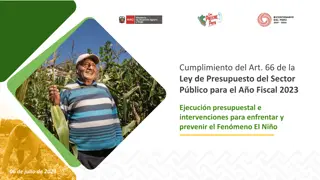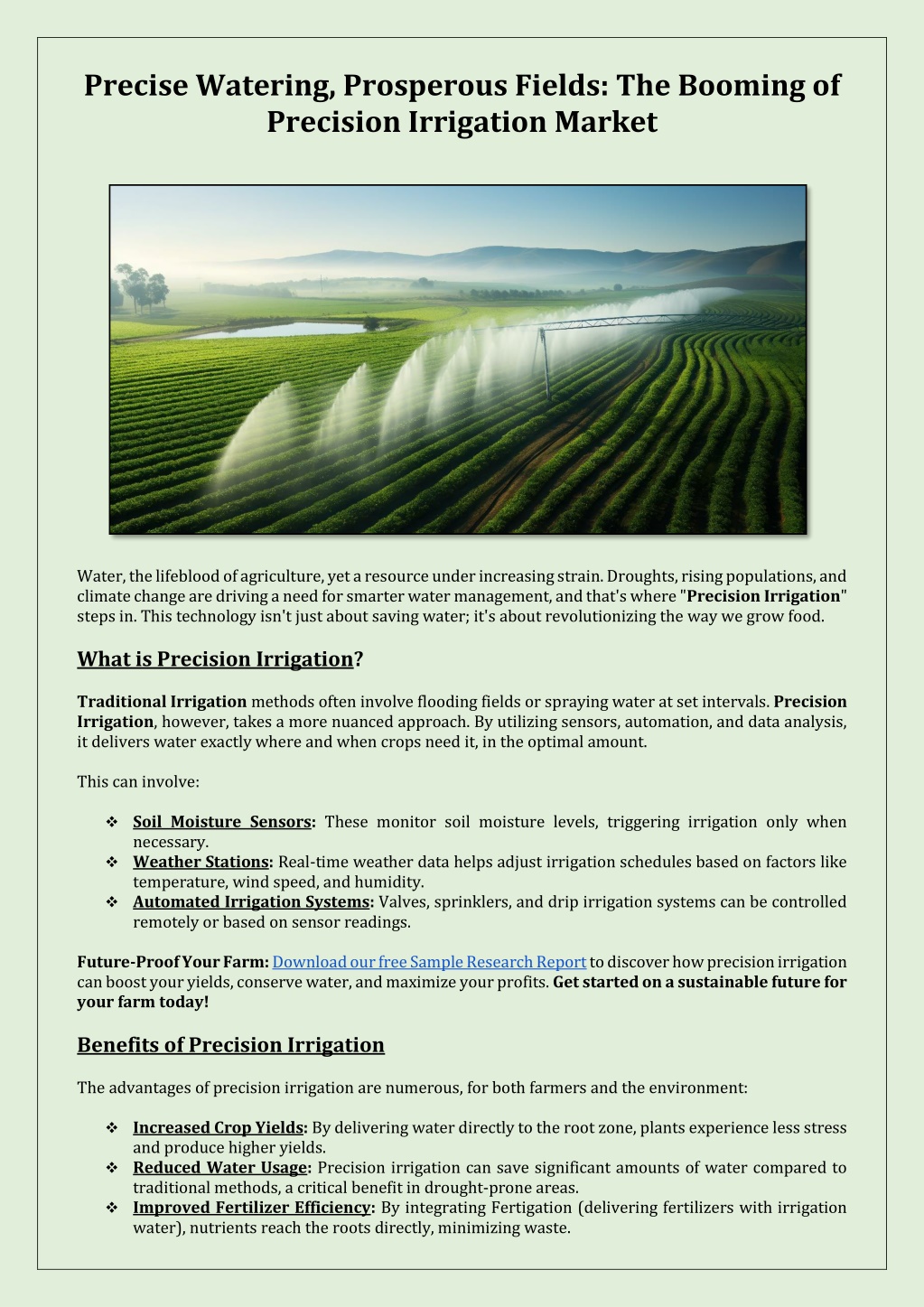
Precise Watering, Prosperous Fields: The Booming of Precision Irrigation Market
The Global Precision Irrigation Market is on a steady rise. According to the BIS Research, estimates suggest a current size of around $2,238.7 Million in 2022, with a projected Compound Annual Growth Rate (CAGR) of 14.84% reaching $4,471.2 Million by 2027 during the forecast period 2022-2037.
- Precision Irrigation Market
- Precision Irrigation Report
- Precision Irrigation Industry
- Precision Irrigation Market Research
- Precision Irrigation Market Report
- BIS Research
- Agriculture
Uploaded on | 0 Views
Download Presentation
Please find below an Image/Link to download the presentation.
The content on the website is provided AS IS for your information and personal use only. It may not be sold, licensed, or shared on other websites without obtaining consent from the author. Download presentation by click this link. If you encounter any issues during the download, it is possible that the publisher has removed the file from their server.
Presentation Transcript
Precise Watering, Prosperous Fields: The Booming of Precision Irrigation Market Water, the lifeblood of agriculture, yet a resource under increasing strain. Droughts, rising populations, and climate change are driving a need for smarter water management, and that's where "Precision Irrigation" steps in. This technology isn't just about saving water; it's about revolutionizing the way we grow food. What is Precision Irrigation? Traditional Irrigation methods often involve flooding fields or spraying water at set intervals. Precision Irrigation, however, takes a more nuanced approach. By utilizing sensors, automation, and data analysis, it delivers water exactly where and when crops need it, in the optimal amount. This can involve: Soil Moisture Sensors: These monitor soil moisture levels, triggering irrigation only when necessary. Weather Stations: Real-time weather data helps adjust irrigation schedules based on factors like temperature, wind speed, and humidity. Automated Irrigation Systems: Valves, sprinklers, and drip irrigation systems can be controlled remotely or based on sensor readings. Future-Proof Your Farm: Download our free Sample Research Report to discover how precision irrigation can boost your yields, conserve water, and maximize your profits. Get started on a sustainable future for your farm today! Benefits of Precision Irrigation The advantages of precision irrigation are numerous, for both farmers and the environment: Increased Crop Yields: By delivering water directly to the root zone, plants experience less stress and produce higher yields. Reduced Water Usage: Precision irrigation can save significant amounts of water compared to traditional methods, a critical benefit in drought-prone areas. Improved Fertilizer Efficiency: By integrating Fertigation (delivering fertilizers with irrigation water), nutrients reach the roots directly, minimizing waste.
Enhanced Farm Management: Data collected from sensors allows farmers to make informed decisions about irrigation practices and optimize resource use. Environmental Sustainability: Water conservation and reduced fertilizer runoff contribute to a healthier environment. Market Growth and Drivers The Global Precision Irrigation Market is on a steady rise. According to the BIS Research, estimates suggest a current size of around $2,238.7 Million in 2022, with a projected Compound Annual Growth Rate (CAGR) of 14.84% reaching $4,471.2 Million by 2027 during the forecast period 2022-2037. Several factors are fueling this growth: Water Scarcity: As freshwater resources become more limited, farmers are turning to precision irrigation to ensure crop production. Government Initiatives: Many governments are promoting water conservation practices, offering subsidies or incentives for adopting precision irrigation technologies. Technological Advancements: Developments in sensor technology, automation, and data analytics are making precision irrigation systems more efficient and user-friendly. Rising Food Demand: A growing global population necessitates increased food production, and precision irrigation helps meet this demand with limited water resources. Market Landscape and Challenges The Precision Irrigation Industry is a diverse landscape with a mix of established players and emerging startups. Major Players include: Rivulis, Galcon, Hunter Industries, and Holman Industries. However, the agriculture industry is also seeing an influx of innovative startups offering new solutions like wireless sensors and cloud-based irrigation management platforms. Despite its promise, the precision irrigation market faces some challenges: High Initial Investment: Installing a precision irrigation system can be expensive, posing a hurdle for small and medium-scale farmers. Technical Expertise: Operating and maintaining these systems may require some technical know- how, which could be a barrier for some farmers. Lack of Awareness: In some regions, farmers may not be fully aware of the benefits and cost- effectiveness of precision irrigation. Future of Precision Irrigation The future of precision irrigation looks bright. As technology continues to evolve, we can expect to see: More Affordable Solutions: Advancements in manufacturing and economies of scale should make precision irrigation systems more accessible to a wider range of farmers. Integration with AI and IoT: Artificial intelligence (AI) and the Internet of Things (IoT) will play a larger role, enabling real-time monitoring, automated decision-making, and personalized irrigation plans for each field. Focus on Sustainability: Water and resource conservation will remain a top priority, driving further innovation in precision irrigation technologies. Conclusion Precision Irrigation is not just a technological marvel, it's a necessity for a future with a growing population and a shrinking water supply. By enabling efficient water use and increased crop yields, it paves the way for a more sustainable and productive agricultural future. As the market continues to expand and technologies mature, precision irrigation has the potential to transform the way we grow food, ensuring a bountiful harvest for generations to come.

